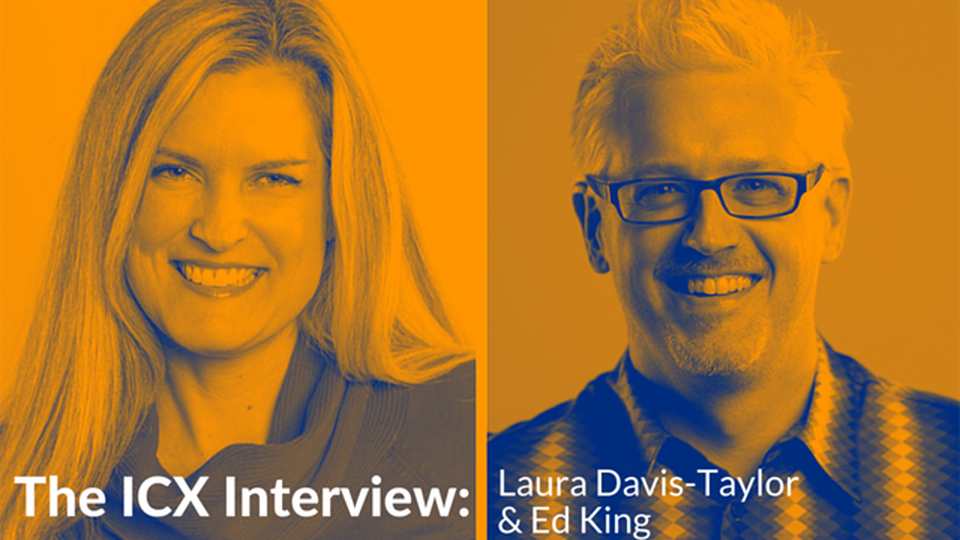Article
ICX Symposium: the new emotional retail economy
The ICX Symposium in Atlanta later this month will feature a session featuring two executives from MaxMedia addressing retail's emotional economy. ICX Association Executive Director Scott Slucher interviewed the duo about the emotional truths of customer engagement.

October 28, 2015
By Scott Slucher, Executive Director, ICX Association
The ICX Symposium series kicks off on October 27th in Atlanta with an event titled "Inflection Point: The Future Tech of Customer Experience" that explores the innovations and approaches that will define success in B2C customer engagement in the coming months and years.
Attendees will be treated to a session led by Laura Davis-Taylor and Ed King, both of MaxMedia, entitled "Welcome to retail's emotional economy — analog, digital, sensory & sound. How it all comes together for emotional retail." With all the talk of gadgetry, there are some fundamental human truths that must be remembered … and followed.
We asked Laura and Ed to sit down and share their thoughts on the future of customer engagement.
Who are you and what do you do?
Laura: I'm Laura Davis-Taylor, and I'm the EVP of Customer Experience at MaxMedia, a digital retail experience firm.
Ed: I'm Ed King, VP of Strategy for MaxMedia Retail Labs. I help our clients discover the intersection between human behavior and business goals.
What makes you uniquely qualified to speak on the interplay of tech and CX?
Laura: I've been working within the intersection of retail, branding, digital and experience design since 1994. I got involved with digital signage while at Miller Zell, working in store design, and saw back in 2000 that an entire new world order was coming for retail and physical experience design.
I spent five years as founder of Retail Media Consulting preaching, teaching and operating as a practitioner for digital retail, and wrote the only book on designing digital experiences in physical stores — "Lighting Up the Aisle."
Ed: Tech is a tool — a means to an end. CX is a very human outcome. Everything I do helps people be more human. If it doesn't pass that litmus test, it's not worth the investment.
What excites you most about where technology is going, as it relates to CX?
Ed: Technology is beginning to allow us to peek inside the non-conscious brain in real-time, in real-context within a person's normal life to understand what's really going on.
We no longer have to rely on asking customers what they think, as it relates to CX. We will know what they really crave in an experience thanks to technologies like wearables, EEG and big-data linguist engines.
Laura: That it's finally happening — digital and physical have become one and brands have become living, morphing, emotionally-infused experiences, rather than just fluffy promises.
The other thing is that for so many years — decades even — retail has been steered by what internal executives believed to be true and what they personally wanted. No longer. Thanks to the disruptive impact of technology on shopping, buying and brand loyalty, retailers are successful only if people like them and want to engage with them.
Power is in the hands of the people, and we are designing CX for them, which makes human-based, insight-driven strategy a mandatory imperative versus a cool notion.
In a rapidly changing technological landscape, what is the single most important trait companies must possess in order to thrive?
Ed: Bravery. Only companies willing to venture out with new, emerging technologies will truly be able to stay on top of a rapidly changing landscape. Consumer expectations are rising daily. If you're not leading, you're behind.
Laura: Flexibility first, humility second.
Back to the point above, executives no longer have the answers to all challenges and when answers are found, they very well may be obsolete in a mere matter of months. The only thing we can count on now is change.
What are some key values that will allow your organization to be successful five years from now?
Laura: We actually just updated our values, all written and voted upon by employees!
- Create the things you wish existed.
- Lead, don't follow.
- Inspire others.
- Test limits.
- Do what you love every day.
- Exceed expectations.
- Be adaptable.
- Glow in the dark.
- Make a difference.
- Predict the future by inventing it.
Ed: Unequivocal empathy with consumers. The minute we start "taking orders" from clients who are more interested in the quick buck and not siding with the consumer and their mindset — that's when we start to be unsuccessful.
What is a huge misconception about technology and what it can do for B2C brands?
Laura: No. 1: Cool is enough. We have a primary filter when it comes to tech — "Could vs. Should." There is a big difference.
Our industry is littered with examples of things that were "cool" but not functionally useful for the average person it was exposed to. This is usually caused by teams who don't get empathetic design and, instead, create what they personally desire. It has hurt us — it's cost the industry years of fits and starts.
No. 2: The tech is the experience. Another core belief we have is that technology should make things more human, not less.
Any technology we create and put into an environment — home, life or store — does not exist in a bubble. Many, many things are happening around it — before, during and after it is experienced — that affect it. What do people see, hear, touch, maybe even taste? Some things dial the holistic experience up, and some drag it down. You have to design your B2C tech with this in mind.
Ed: Tech alone is not a solution. You must understand the context of the consumer journey to understand where tech is welcomed and where it's not. For instance, iPad wine lists seem to be all the rage — even in Michelin-starred restaurants. Wine is a hand-crafted product, rife with emotions. It deserves a tactile list … something that expresses its individuality, texture and personality. Something like thick cotton cardstock … letterpress printing. Not a sterile iPad screen.
What are some innovations that you see in the near-term future that really excite you?
Ed: Augmented reality is starting to offer some real benefits. Virtual reality is a game changer. Wearing a headset once and experiencing your brain being fooled was enough for me to consider it a real disruptor in business and retail.
Laura: Applications including:
- Beacons;
- Virtual reality;
- Intelligent things that can filter out only the information relevant to me — signs, shelves, watches, etc.;
- Social becoming a shopping/buying platform;
- Projection technologies;
- Neuroscience-based experience research; and
- New retail formats (blurring the lines of the store walls and what retail even is).
What brands are doing the best job of engaging customers in a meaningful way with technology?
Laura: A few great examples of innovation and CX come to mind:
- The Starbucks app - Increase loyalty, mitigate wait time, create easy pay.
- Instacart - Make it easy to order and deliver groceries from my favorite store.
- Automated retail—The new vending machines that offer only hot, super interesting products in places you're at anyway.
- Rebecca Minkoff - Love her magic mirrors that know what products are in the dressing room, serve up hot looks/items associated with them, let you call the associate and let you save and share.
- AT&T - the Michigan Avenue Experience Store is their flagship and totally redefines how technology, content and great customer experience and products come together to create a magical, compelling store experience.
Ed: Amazon's same-day delivery and dash buttons offer real solutions to real problems. Rebecca Minkoff's store in New York is a novel, tech-forward shopping solution for brick and mortar. Burberry has done a great job at blending physical and digital for a truly emotional shopping experience.
What is the biggest caution for early adopters of new tech innovations?
Ed: Start small and test. Don't invest large in a sexy emerging technology. Trial it, test it, refine and test again. If you don't see results, move quickly to the next thing.
Laura: Work with seasoned experts — don't try to figure it out for yourself. There's a lot of people that are driving projects that are totally new to this stuff and don't know what they don't know. Many people have spent years in this industry and have many, many lessons learned — the hard way. There is no reason to risk the outcome of an innovative, CX-driven project without enlisting these people. And when you enlist them, let them teach and steer you. Your outcome is guaranteed to be exponentially higher.
***
Tickets are still available to the ICX Symposium. For more details, click here.
Scott Slucher has spent his career working in and around CX, covering the kiosk, digital signage and retail markets as an editorial contributor for KioskMarketplace.com, DigitalSignageToday.com and RetailCustomerExperience.com. He later joined Networld Media Group full time as an account executive, where he worked with a wide array of clients in these markets. Most recently, Scott held the position of VP, Sales and Marketing, at a mystery shopping and brand auditing firm, deepening his interest in what makes for good CX. Part of that experience required doing field work to research and document customer experiences for major brands.
 ChatGPT
ChatGPT Grok
Grok Perplexity
Perplexity Claude
Claude









